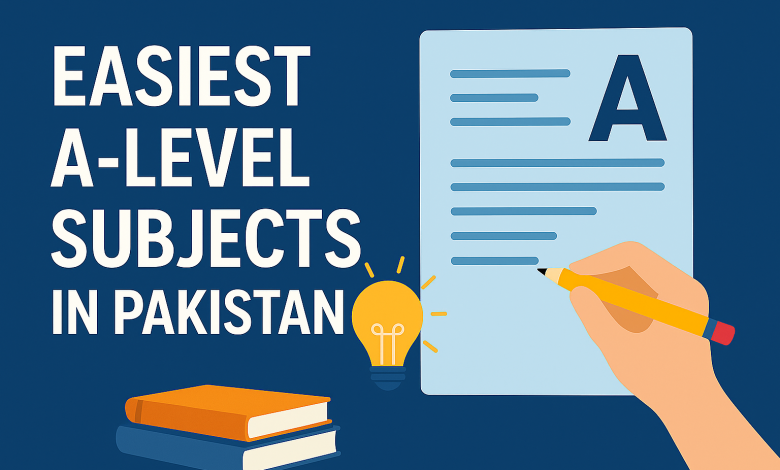Easiest A-Level Subjects in Pakistan

Choosing your easiest A-Level subjects is a significant decision that influences your future academic and career paths. While there’s no single “easiest” subject (it depends on your skills and interests), some A Level subjects are often perceived as more manageable by a wider range of students. This blog explores these subjects, offers insights into the A Levels in Pakistan, and addresses frequently asked questions.
Understanding A Levels in Pakistan
- Globally Recognized: A Levels (Advanced Levels) are internationally recognized pre-university qualifications offered by Cambridge Assessment International Education (CAIE).
- Subject Choice: Students typically take 3-4 A Level subjects over two years. There’s flexibility to tailor subject combinations based on your goals.
- Grading: A Level exams are graded from A* to E (pass), and contribute to your eligibility for different university programs worldwide.
Number of Subjects Offered
CAIE offers over 55 A Level subject choices across diverse disciplines. However, not every school in Pakistan offers the full range. Research schools in your area to see what subjects they provide.
Commonly Considered “Easier” A Level Subjects
It’s important to remember that “easy” is relative, and success in any A Level depends on your interests, skills, and dedication. However, some subjects might be more manageable for a wider range of students due to their content and assessment style. Here’s a look:
- Business Studies:
- Focus: Introduces core business concepts, management strategies, marketing, finance, and human resource management.
- Why It Might Be Easier: Less emphasis on complex calculations or scientific theories, relies more on understanding, analysis, and applying concepts.
- Sociology:
- Focus: Examines social structures, cultures, inequality, and how societies function.
- Why It Might Be Easier: Primarily involves essay writing, critical analysis, and evaluating social trends. Appeals to those who enjoy discussion and have strong writing skills.
- Psychology:
- Focus: Explores the human mind, behavior, development, and psychological theories.
- Why It Might Be Easier: Combines essay-based analysis with some scientific concepts and terminology. If you’re fascinated by why people act the way they do, this might be a good fit.
- Accounting:
- Focus: Involves financial record-keeping, preparing financial statements, auditing, and analyzing business performance.
- Why It Might Be Easier: Primarily based on numerical data, calculations, and following logical accounting procedures. Appeals to students with strong mathematical aptitude.
- Languages:
- Focus: Developing advanced speaking, listening, reading, and writing skills in a specific language.
- Why It Might Be Easier: If you choose your native language or a language you already have fluency in, the A-Level focuses on refining existing skills rather than teaching from scratch.
Important Reminders:
- Choose Based on Interest: Don’t pick a subject solely because it’s considered “easy.” Interest fuels motivation and leads to better performance.
- Workload Matters: Even “easier” subjects have rigorous syllabi and demand consistent work to achieve the top grades needed for competitive university admissions.
- Seek Guidance: Talk to teachers, counselors, and older students who’ve taken the A-Levels for insights into the specific subjects you’re considering.
A Note on “Easy” Subjects
- Subjective: What’s easy for one student might be challenging for another. Your strengths, interests, and study skills play a major role.
- Workload: Even seemingly “easier” subjects have rigorous syllabi and demand consistent work to achieve excellent grades.
Top hardest A Level Subjects
- Further Mathematics: Further Mathematics delves into advanced mathematical concepts and complex problem-solving. Learn more about it in our blog Is further math the hardest A Level?
- Physics: Demands strong mathematical and analytical abilities.
- Chemistry: Involves complex concepts, calculations, and lab work.
Is It Easy to Pass A Levels?
A Levels are designed to be challenging and prepare you for university-level studies. Passing requires:
- Consistent Hard Work: Don’t be fooled by labels like “easy”. Success needs dedicated effort.
- Smart Subject Choices: Select subjects based on your interests and abilities, not just perceived easiness.
- Effective Study Habits: Develop strong time management, note-taking, and exam preparation techniques.
Tips to Get an A* in A Levels
Achieving the top A* grade requires going beyond general study tips. Here are A-Level specific strategies:
- Demonstrate In-Depth Understanding: A* answers reflect deep knowledge, not just memorized facts. Explain concepts, link them to real-world examples, and show critical thinking.
- Master Application: A Levels often ask you to apply knowledge to unfamiliar scenarios. Practice questions that require analysis, problem-solving, and evaluating different viewpoints.
- Nail Essay Technique: Many A Level subjects involve longer essays. Structure your answers clearly, support arguments with evidence, and pay attention to academic writing style.
- Become a Past Paper Expert: Analyze marking schemes to see what A* answers look like. Identify patterns in examiners’ expectations and practice achieving those standards.
- Dig Deeper: Don’t limit yourself to the textbook. Read research papers, journals, or articles related to your subjects to broaden your knowledge base and impress examiners.
- Time Management is Key: Practice finishing longer essay questions or complex calculations effectively within exam time limits.
- Seek Subject-Specific Mentorship: Find tutors for targeted advice. For additional support, consider a qualified A level tutor from a platform like foriEDU.com to help you bridge gaps and refine your exam techniques.
Important Note: These strategies won’t substitute for dedicated study of the content itself!
Conclusion
Choosing the right and easiest A-Level subjects is crucial. Prioritize subjects that align with your interests, strengths, and future goals. Don’t underestimate the workload of any A Level subject – focus on consistent effort and developing effective study strategies for success.




I was looking through some of your content on this website and I conceive this
web site is rattling informative! Keep posting.